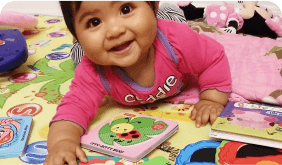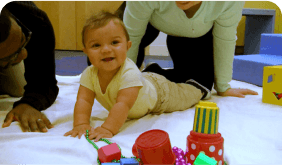
Some babies start “sleeping through the night” (getting 4-6 hours of sleep at a time) by the end of the newborn stage, but it can take longer for many others.
Strategies to help Baby get better sleep include keeping Baby active during wake windows and following a consistent bedtime routine.
Changing sleep patterns and frequent wake-ups can be frustrating, but sticking to safe sleep habits is so important.
Sleep is important at every age, but especially in Baby’s first year! Infants will spend more than half of it snoozing to fuel their growth and development. But what happens if Baby isn’t exactly a sleep superstar?
If Baby isn’t getting good, quality shut-eye, there are a few things that can help encourage longer stretches of rest (for both of you!). But first, let’s talk about what typical baby sleep looks like!
How Much Sleep Do Babies Need?
Newborns can sleep up to 17 hours a day, but it’s not all at once. Their sleep is spread out in short stretches throughout the day and night. As they get older and develop a circadian rhythm, those night stretches will get longer. Some babies start sleeping “through the night” (getting 4-6 hours of sleep without waking) by the end of the newborn stage. For many others, it can take longer.
Typical sleep past the newborn stage looks like this:
From 4–11 months, babies need about 12–16 hours of sleep in a 24-hour period, according to the American Academy of Pediatrics.
By 7–9 months, many babies begin to settle into a more regular sleep schedule—but sleep regressions and growth spurts can still shake things up.

If Baby is having trouble with their sleep, try these strategies to help them get more restful, consistent shut-eye.
Check Their Swaddle
If Baby is still swaddling, make sure they are secure and comfortable. Consider trying a different swaddling method if Baby continues having trouble falling asleep. Remember, swaddling should end once Baby shows signs of rolling (this can happen as early as 4 months).
Keep Baby Active During the Day
Worn-out babies sleep better! Even if Baby isn’t crawling or cruising yet, there are still ways to keep their little minds and bodies engaged. During wake windows, try:
Exploring toys or mirrors
Playing simple games like peek-a-boo
Visit the Play page for more activities to help Baby stay active and work toward milestones!
Set a Soothing Bedtime Routine
Babies thrive on predictability! A calm, consistent bedtime routine helps Baby wind down and know sleep is coming. You might include:
A warm bath
A quiet feeding
Gentle rocking or cuddles
A lullaby or short story
Even very young babies start to recognize bedtime patterns, and this can make it easier for them to self-soothe.
Stick to a Sleep Schedule (As Best You Can)
Of course, babies aren’t robots (and neither are you!), so there will be some variation from day to day. But aiming for roughly the same nap and bedtime each day can help regulate Baby’s internal clock. Use light and dark cues (like dimming the lights in the evening) to signal when it’s time to rest.
Always Follow Safe Sleep Guidelines
It can be tempting to try anything when you’re desperate to get Baby to stay asleep, but sticking to safe sleep practices is so important. That means:
Always placing Baby on their back to sleep
Keeping Baby’s crib or bassinet clear of toys and loose bedding
Avoiding co-sleeping and side or tummy sleeping
Your peace of mind is worth it, and safe sleep habits lay the foundation for restful nights ahead.
Learn about the ABC’s of safe baby sleep!
Still struggling with Baby’s sleep?
If nothing seems to be helping, talk to Baby’s healthcare provider. They may offer personalized tips or help you explore possible sleep challenges further.





